|
Given that a sizeable proportion of modern filmmakers – those of the so-called "film generation" – were drawn to their profession by a long-standing love affair with cinema, it's hardly surprising that a few of them have chosen to directly celebrate this in their work. Most of them take the flattery-by-imitation approach, borrowing ideas and imagery from their cinematic heroes and trying to emulate their style, and even occasionally remaking their work. But every now and again all pretence is cast aside and a film comes along that celebrates a director's passion for the medium in no uncertain terms, the most celebrated example being François Truffaut's 1973 Day for Night [La nuit américaine], a beguiling hymn to the headaches and unique delights of the filmmaking process.
Even more rarely a film appears that champions not just the medium but the venue in which it was once exclusively enjoyed, a personal favourite being the 1957 Basil Dearden comedy The Smallest Show on Earth, in which a young couple inherit an old picture house that a rival cinema owner is looking to purchase on the cheap and replace with a car park. Thirty-one years later the planned demolition of a once treasured but now decrepit cinema to make way for a car park also became a plot twist in what has become the most beloved of all films based around the provincial movie house, Giuseppe Tornatore's 1988 Cinema Paradiso (actually Nuovo Cinema Paradiso, or "New Cinema Paradiso", a title by which it is strangely not known outside of of its native Italy).
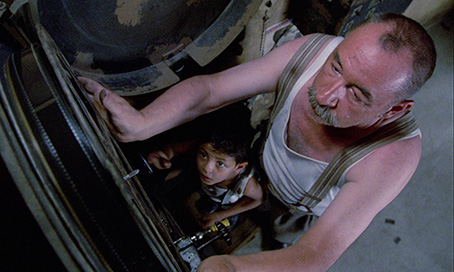
Successful film director Salvatore Di Vita returns late one night to his palatial apartment in Rome to be told by his latest girlfriend that his mother has phoned to tell him that a man named Alfredo has died. The news prompts Salvatore to recall a key period from his childhood in the Sicilian town of Giancaldo, a place where the local cinema was the primary communal hub, a venue in which people of all backgrounds came together to lose themselves in the films screened by the middle-aged projectionist Alfredo. While others are mesmerised solely by the the films themselves, young Salvatore – who was known back then as Toto – is also captivated by the process of their projection, much to the annoyance of the irascible Alfredo. But when Alfredo is unable to make sense of a basic literacy exam, Toto trades the answers for access to the projection booth, where Alfredo instructs him in the technical process of running the cinema. When a fire triggered by a highly combustible nitrate film robs Alfredo of his position, Toto becomes the projectionist in the rebuilt Cinema Paradiso, but his love of film is soon sharing emotional space with his infatuation with the beautiful Elena.
OK, confession time. I've never been quite as taken by Cinema Paradiso as so many others appear to be, though it's been so long since I last saw it that I had trouble recalling just why. Given my dislike for children I assumed that I'd had an allergic reaction to the young Toto, but returning to the film after so many years I'm happy to admit that he pretty much steals the first half of the film. Brashly self-confident and boasting a puppy-eyed cuteness that would normally have me wincing, nine-year-old first-timer Salvatore Cascio is a genuine natural and the perfect foil for the splendid Philippe Noiret as the gruffly irritable Alfredo, while his unbridled enthusiasm for film and the workings of the projection booth are an easy point of empathy for all like-minded souls. There's also a contagious and inventive energy to the filmmaking here and a real wit to the storytelling, an approach signalled early on when parish priest Father Adelfio (a lovely comic performance by Leopoldo Trieste) sits down in the cinema for a private screening and his clear enjoyment of the film is intermittently disrupted by scenes in which couples kiss, which prompts his expression of entrancement to snap to one of stern disapproval, accompanied by the agitated ringing of what we quickly realise is a censorial bell.
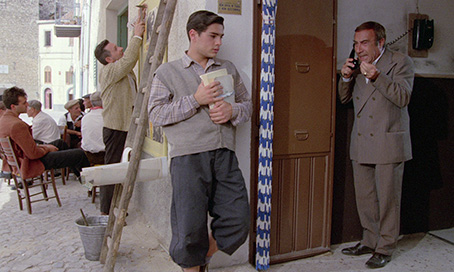
It's when Toto hits his teenage years and starts pining for Elena that my interest fades a little. The pace may drop a tad but the filmmaking still shines – the essentials of Toto's military service are covered in a snappily constructed one-minute montage, and the funding and rebuilding of the cinema dealt with in just two juxtaposed shots. But while a kid in love with with cinema and its workings is not common film material, a good-looking teenage boy falling for a pretty teenage girl from across the tracks has been the subject of cinematic romance from around the world since the earliest days of the medium. It probably doesn't help that this love affair shamelessly strides into the realm of romantic cliché, notably when a perfectly timed and seemingly summoned storm cuts short an open-air screening and Salvatore and Elena fall to the ground and kiss in the rain, exquisitely backlit by lightning and serenaded by Ennio Morricone's emotional score. And good though actor Marco Leonardi is, for me the teenage Toto is nowhere near as beguiling as his younger incarnation, and that's coming from someone who claims to dislike children.
But as a distinctly European drama the film nonetheless rallies round by refusing to walk the obvious path of romantic resolution and takes chances by leaving key questions unanswered and some emotional scars unhealed, at least in this cut (more on that below). And when the middle-aged Salvatore (a finely judged turn by Jacques Perrin) returns to to his home town, this lack of resolution allows Tornatore to walk a fine line between overt sentimentality and emotional honesty without missing a step. Partly as a result, this time I watched the justly celebrated final scene – whose content I won't reveal but which resonates on both a dramatic and subtextual level – with moistened eyes and a small lump in my throat.
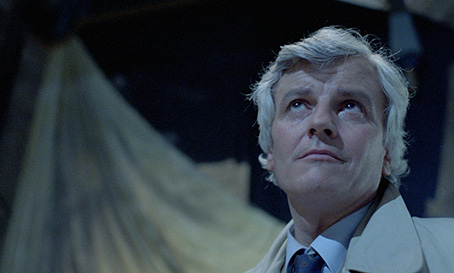
There's no question that Cinema Paradiso is a heartfelt and entrancing hymn not just to the magic of film as a medium, but the sort of thrilling movie-house experience that has effectively been confined to history by changing times. It's something the film itself acknowledges both in the final image of the cinema of the title and the character of Alfredo, whom director Giuseppe Tornatore claims is representative of cinema itself (watch the extra features for a full explanation – it does make sense). That I'm not quite as fond of the teenage Toto's pursuit of Elena as I am of his adventures as a young boy and his friendship with Alfredo probably says as much about me as it does about the cinematic profusion of the teen romance elements, and I'm happy to admit that for its gorgeously textured first half and the emotionally charged finale, it's still one of cinema's most entrancing and seductively crafted love-songs to the medium that gave it birth.
Two versions of the film are included in Arrow's new 25th Anniversary Blu-ray: the international theatrical release version and the director's cut. The film originally premiered in Italy at 155 minutes in length and was recut by Tornatore himself to 123 minutes for international release after the film failed to do box office business on its initial Italian release. Following its subsequent success at Cannes (where it won the Grand Prize of the Jury) and the Oscars (Best Foreign Language Film) and a number of other prestigious festivals, the 155 minute original cut was re-released in Italy, and the 173 minute director's cut was released internationally in 2002.
While I'm always glad to see any film as the director originally intended, I do occasionally wonder if the circumstances that force a recut just occasionally do the film in question a favour. I have to admit that the prospect of more adventures in the company of young Toto was an enticing one, but his is the only segment that remains largely unchanged, and what we have instead is a lot more of Salvatore and his relationship with Elena both as teenager and adult, some of which clarifies details that for my money worked better as ambiguous uncertainties. It could be argued that the increased length of the final section, when the adult Salvatore returns to his home town of Giancaldo, transforms the final bookend into a fully fledged third act, but where previously Salvatore's involvement with Elena was a single (albeit important) component of his bumpy journey from youth to manhood, in this cut it has grown to become the focal point of the story.
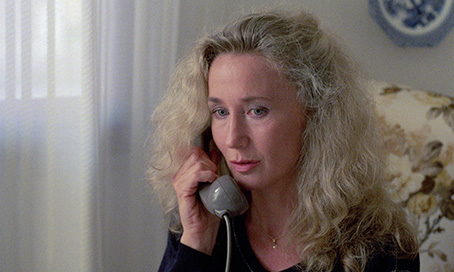
The restored footage also changes how we view Alfredo by revealing exactly what happened on a fateful day in Salvatore's youth. It's an element I can't discuss without getting into serious spoiler territory, but those who have seen both versions of the film will likely be aware that there has been some debate about Alfredo's motives and the morality of his decision. I'm not going to get into that here in any detail, but would suggest that neither of these elements are as clear-cut as some have suggested and seem to me to be driven more by Alfredo's own life experience and regrets and his fatherly feelings towards Salvatore than any malicious or selfish intentions on his part.
It is worth noting that an alternative ending that appeared in some longer cuts of the film is not included here. Word has it that the film is better off without it.
Before the film begins there's a title card informing us of the restoration undertaken exclusively for this release, from which the following indented text is quoted.
The original camera negative elements were scanned in 2K resolution at Technicolor Rome, with all grading and restoration work completed at Deluxe Digital Cinema – EMEA, London. Throughout the process, care was taken to ensure that the film's original texture, details and grain structure remained unaffected by digital processing. Although every effort has been made to present Cinema Paradiso in the highest quality possible, some minor picture issues remain, in keeping with the condition of the original archive materials.
Which is all well and good, but how does it look? Absolutely bloody lovely. As the above proclamation suggests, there are a few shots that fall a little short of the quality bar set elsewhere, but not by a lot and the best material here has been gorgeously restored and transferred. Unsurprisingly, perhaps, the real showcase scenes are those set outside in the Sicilian sun, where the fabulous contrast range, naturalistic colour and rich level of detail are intermittently a feast for the eyes. But the most arresting shots are not confined to the daylight hours – the night-time wides of the fishermen watching the outdoor screening from their boats are similarly impressive, with colours distinctly rendered even in the blue hue of moonlight, while shadow detail survives the crisply rendered blacks. Grain is visible, as you would expect from any carefully handled restoration, but most of the time you'll need to sit close to the screen to see it. It's worth noting that the restoration has been carried out on all of the footage, so there is no quality drop on the extra material in the director's cut. The framing is the original 1.66:1. An outstanding job.
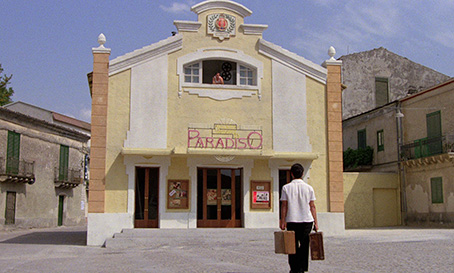
You can choose between two soundtracks, Linear PCM 2.0 stereo or DTS-HD Master Audio 5.1 surround. Both have excellent clarity, no obvious background flaws and shine brightest on Ennio Morricone's strings-driven score. There's actually little to choose between them, suggesting that the 5.1 is actually a DTS recode of the stereo – certainly there is little going on at the rear of this track – if this were a fully fledged remix you would expect the audience bustle in scenes set in the cinema to assault us from all directions rather than sit at the front as it does here.
Audio Commentary
More than once in the past I've remarked that I'm not always a fan of so-called 'expert' commentary tracks, though I usually say that to introduce one that is actually an enthralling listen. The one here is provided by Millicent Marcus, Professor of Italian at Yale University and author of a number of books on Italian cinema, and I'd love to tell you that this is just such a commentary, but frankly it's anything but. Most of the time Ms. Marcus simply describes what's happening on screen ("Here we have Don Ciccio, the proprietor of the Cinema Paradiso, arguing with his distributor") or observes the purpose of shots or edits, which should be obvious to even a half-aware viewer. At times it plays almost like an audio description for the visually impaired (an irony that will not be lost on those who've seen the film). Perhaps the most bemusing moment for non-Italian speakers comes when Marcus elects to stop talking for a while to allow us to listen to a story Alfredo is telling the teenage Salvatore, which is delivered in Italian and without English subtitles (you can call them up with the pop-up menu, but they're not on by default for the commentary track). Just occasionally Marcus breaks with her descriptive approach to offer a snippet of useful cultural detail, and at one point finds parallels between the adoration of cinema and religious belief, a frankly fascinating theory that deserves to explored in more depth that it is here. Best of all are some welcome contributions from director Giuseppe Tornatore himself, which while teasingly brief and sparsely located are always interesting.
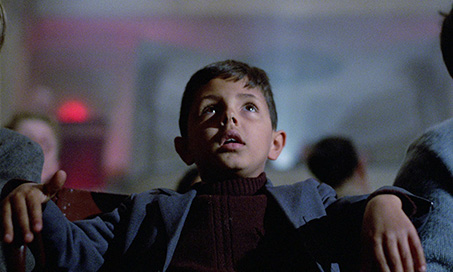
A Dream of Sicily (54:47)
A documentary produced for either an Italian TV screening or home video release in which Giuseppe Tornatore explores the influence on his work of the Sicily of his childhood, which is illustrated with extracts from his films, including early documentary material shot in his home town of Bagheria. Rather thrillingly, this includes the very first footage he ever filmed, done on a borrowed camera at the age of 13 and whose framing and eye for arresting imagery puts the work of the average first year UK media student to shame. He charts his development through the people, places, events and films of the time and place, not in the style of a linear documentary portrait but the fragmented manner with which we tend to remember our past. It's an intriguing piece, although a couple of name captions are not translated (it is useful to know, for example, just who Peppino Ducato is to better contextualise his contribution), and Burt Lancaster's English monologue from Visconti's The Leopard [Il gattopardo] is curiously also subtitled in English, subtitles that retain the meaning of the speech but do not accurately reproduce the words.
A Bear and Mouse in Paradise (27:26)
Tornatore recalls his first experiences of cinema and how the idea for the film came about, then focusses on the key roles of Alfredo and young Toto and the actors who play them, with actors Philippe Noiret and Salvatore Cascio (now an adult, of course) providing their own recollections. Noiret in particular has some engaging memories, describing Cascio as "a real brat because he came to be ruler of the shoot," but quickly tempering this with "He knew to be an actor he had to be a creator and a performer. He always invented new things. He was always spot on." His story of Cascio's hatred of his cigars is backed up by an extract from what looks like the Cannes press conference, and he describes the shoot itself as an exhausting experience. Tornatore also talks about the main square location and the difficulty of shooting two key scenes involving the cinema exterior. An illuminating extra.
The Kissing Sequence (7:01)
Giuseppe Tornatore outlines how the idea of a priest censoring the films being shown in a provincial cinema was drawn from real-life (albeit stories told to him rather than first-hand experience) and discusses one of the film's most fondly remembered sequences, for which we're also given a textual breakdown of the actors and films involved – I can't reveal more without delivering spoilers for first-timers.
25th Anniversary Trailer (1:42)
Headed by a Guardian reader poll that proclaims this "The greatest foreign film of all time" (I won't even start with what's wrong with that technically impossible claim) and a "timeless classic" (classics are always timeless), this does play on the film's romanticism and sentimentality, but is still a reasonable sell.
Director's Cut Trailer (1:22)
"Experience the passion that spanned the years," the cheerfully warm narration for the 4:3 framed American trailer for the director cut assures us. Unsurprisingly, perhaps, the love story is pushed to the fore here.
Laso included is a Booklet but this wasn't included with the review disc, so I can't comment on this.
There's little doubt that Cinema Paradiso's enviable reputation comes as a much from the breadth of its popularity as its undeniable qualities as cinema. It's worth noting that on its previous UK Blu-ray release, also from Arrow, I offered it to all of the site's reviewers (we had a few back then) and had no takers, it being a film that all seemed to like but that none were passionate about. Coming back to it after a break of several years and seeing it looking as good as it does here, I was able to better appreciate its very real qualities, particularly the economy and wit of Tornatore's direction and the wealth of character detail in that captivating first half, and it was great to re-experience the emotional kick of the finale as if seeing it for the first time. It matters not which cut of the film you prefer as both are included here, and despite a commentary that only intermittently delivers the goods, the other extra features compliment the film well. If you're a fan of the film – and so many are – then this is definitely the version to own. Warmly recommended.
|